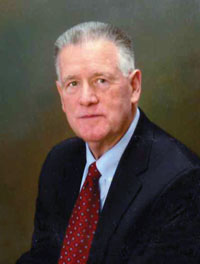ISBA Development Site
This website is for ISBA staff use only. All visitors should return to the main ISBA website.
This website is for ISBA staff use only. All visitors should return to the main ISBA website.
September 2016 • Volume 104 • Number 9 • Page 22
Thank you for viewing this Illinois Bar Journal article. Please join the ISBA to access all of our IBJ articles and archives.
The market for buying and selling law firms is still maturing several years after such deals became legal in Illinois. A recent buyer and a champion of the rule change that allows transfers describe some of the legal, financial, and ethical considerations.
 In early 2012, Peter Olson, a Chicago-based sole practitioner concentrating on family law with some clients in other areas, happened upon an anonymous Craigslist listing that advertised a law practice for sale. The owner of the practice, which also focused on family law, was looking to retire and hoped to find, in effect, a successor - for the right price.
In early 2012, Peter Olson, a Chicago-based sole practitioner concentrating on family law with some clients in other areas, happened upon an anonymous Craigslist listing that advertised a law practice for sale. The owner of the practice, which also focused on family law, was looking to retire and hoped to find, in effect, a successor - for the right price.
His interest grew upon discovering that the seller was an acquaintance of Olson, who will speak on the topic of buying and selling law practices, along with Rockford-based real estate and estate planning attorney John Maville, at the ISBA Solo and Small Firm Practice Institute in September (see sidebar on page 25).
So they reached a simple buyout agreement through which Olson effectively worked for the firm for a few months as the seller transitioned out, then took it over - not only the client files but the office, staff, computer systems, and other property.

"Those were the simple logistics of it," says Olson, who renamed the practice Chicago Family Law Group LLC. "We did a buyout over a number of years. The money part you can slice a lot of different ways. We probably could have and should have had a degree more formality and complexity than we did. The purchase was just, 'On this date it's effective, and here are the payment terms going forward,' and that was it."
The seller had almost no involvement in the firm after the sell date, and in fact had been transitioning to operating other non-legal business interests for some time, Olson says. "He'd been one foot out the door, and it was, 'Hey, if I can make some money off this transaction, that's great,' and he did," he says. "I inherited and kept two associates and a support staff person." One associate was let go when Olson joined, but otherwise, "The rest of the team was with me for years going forward."
Olson has a bit of advice on how to search for such opportunities. But he says the market is not yet well-established since the Illinois Supreme Court formally allowed buy-sell arrangements of sole practitioner firms to go forward with the promulgation of Rule 1.17 in 2010, based on the ABA's Model Rule 1.17.
"It's hard to know, or hard to find, when people are buying or selling practices," Olson says. "I'm asked about it, not daily, but with some frequency, and there really isn't much of a market for it. I'll see the occasional listing in some of the bar journal, lawyer-focused magazines. The only other resources I know of are a few law practice management people who do brokering of that."
Surmounting ethical concerns

Maville says he and Champaign-based family law practitioner John Phipps led the charge in the late 2000s to convince the Illinois Supreme Court that selling a solo practice should be ethically permissible. Although Maville has not bought or sold a practice himself, he became interested in the idea, learned that "most" other states allowed it, and as then-members of the ISBA's General Practice, Solo, and Small Firm Section Council, he and Phipps talked with practitioners and found that many were unhappy with the status quo.
As a result, they began speaking out on the topic in public forums, wrote articles for publications including the Illinois Bar Journal, and ultimately met with a former chief justice of the Illinois Supreme Court to present their reasons why the rule should be adopted and the ethical objections were insubstantial. It took a change in chief justice, but the supreme court ultimately agreed.
"It struck me as ridiculously unfair and inappropriate that sole practitioners in Illinois could not sell practices after they spent their whole careers building them," Maville says. "They just had to close their doors and walk away without a penny."
Olson bumped up against the supreme court's earlier hesitation because he had wanted to take over the practice of a friend of his parents right after leaving law school, but a simple purchase like he conducted more recently was not yet allowed. "You had to do all sorts of wrinkles, forming some kind of entity, a form of partnership," he says. "It wasn't ethically allowed, what I'm calling the simple buy-sell."
Based on Rule 1.17 and some of the language in associated Rules 1.15 and 1.3, Maville created a checklist for what a lawyer who wants to sell his or her practice needs to do and to have in place, which derives in part from already established ethical responsibilities for sole practitioners to have a transition plan in the event they cease practicing, whether voluntarily or due to a medical event.
"Lawyers have an ethical responsibility to transition their clients in whatever way best suits their circumstances," he says. "I talk usually about doing a power-of-attorney to allow someone to take over your practice, to handle your practice, if you do suffer a medical emergency, and what they should do, and what it should provide for."
For his own practice, Maville has provided a checklist to his longtime office manager on how to handle such a situation, "right down to a script to say to clients, 'Mr. Maville has suffered an unfortunate medical event, and I know he's been handling your case, and I know the next court date is thus-and-such.' So if one morning I didn't show up, she would be able to refer to that checklist and handle that initial transition." And then the attorney he has designated to step in for him could take over.
Maville makes another ethical recommendation that dovetails with wise management practices. "To me, the most important thing that a selling lawyer needs to do is to be organized," he says. "That may seem obvious, but an awful lot of lawyers I'm familiar with are not. It's so that if an unexpected event did occur, another lawyer could walk into their office and pick up their files and know what needed to be done next."
That doesn't mean you need to have a fancy computer filing system; in fact, at age 74, Maville, who concentrated on family law for many years before transition to his current transactional practice, mostly still relies on hard copies. "What I do is based on systems I have created that I think make my practice organized and capable of being managed in my absence by someone who is an attorney," he says.
The main ethical consideration that Olson sees now is the duty to inform clients of the change in ownership and their options going forward. "It's the notice provisions to current clients: 'You have the right to change attorneys. We have this money in your trust account if you want it back,'" he says. "It's not unclear. You just need to follow the rules on it."
Is the price right?
Having succeeded in making such a purchase, Olson tends to encourage those who approach him to strongly consider the idea. "The X factor being, obviously, is the price right?" he says. "What are you spending?" And then, on the other side of the ledger, what are you getting in terms of active clients, staff, office space, and computers and management systems?
"You're buying active clients," Olson says, adding that he acquired somewhere between 75 and 100. "That has a lot of value, especially if [you, like me, are] able to work in the practice for a few months" before making the decision to buy. "These are good cases with paying clients, and that's worth a decent chunk of money," he says.
How much money depends partly on the likely longevity of such clients, which, in turn, depends partly on the practice area(s) in question. While family law might seem on the surface like a one-time type of practice aside from the occasional serial divorcee, issues like child support can keep cases active for longer, Olson says. "Even to this day, it's a pretty small number now, and this might speak to the length and contentiousness of some family law cases, but there are a handful of those current initial clients I bought who are still active" more than four years later, he says.
Even past client files and client contact information has some value, Olson adds, noting that "people I didn't represent, but the predecessor firm represented, are just calling in the past couple of weeks" with additional requests.
"There is repeat business for modifying or changing things, especially when you have children involved," he says. "Depending on the practice area, that could vary a little. Is the nature of the practice something that might be one-and-done, like a real estate closing or a will and trust, vs. another extreme like municipal law, in a business area, where it's constantly ongoing? Family law is somewhere in the middle of that."
Smoothing the transition
Perhaps it goes without saying, but especially in the early weeks and months, the buyer should not take for granted that those clients will definitely stay with the firm, Olson cautions. "Are you going to be able to keep those clients, to where you earn income from them?" he says. "I came in and worked a few months, and not to be immodest, but they saw I was doing good work on their behalf."
But the danger of clients departing en masse is probably overstated, Olson says. "It's a pretty vested relationship. If you introduce yourself, and you've been in the business for awhile, and you keep the seller in the business for awhile [after you begin], there are lots of ways to bridge that." Related to that, he adds, is the reputation of the seller, which you can determine somewhat by perusing online reviews. "I dealt with that a little bit," he says. "There were a few sour grapes with the firm I was purchasing. But once they saw the work we were doing," those clients stayed.
Olson compares the "stickiness" of law clients with that of bank customers when a purchase occurs. "I have bank accounts at Chase Bank," he says. "The only reason is because they bought banks where I had had accounts. How hard would it be for me to move my checking and savings accounts?" Not very, yet he hasn't, he says.
"Your attorney relationship is a lot closer," he adds. "The loyalty and stickiness is pretty strong, as long as you come in and do good work. If you come in and don't do that well in the first three to six months, you might undermine what you just bought. You want to do great work always, but especially in the first three to six months."
Staff, operating systems, and marketing are other considerations in sizing up the transaction, Olson says. "I inherited a couple of good staff people," he says. "One thing I didn't get was a good operating system, business systems, the equivalent of a McDonald's operating franchise - this is how we do things." The former owner "had been out of the business long enough that it was a little sloppy." In addition, he adds, "Especially in the consumer space - real estate, divorce, or child custody - the website matters a lot, the Internet assets."
Tips for sellers
Aside from the ethical concerns, Maville makes a number of other recommendations to sellers, based on research he has done for presentations on the subject, which in many cases are the flip side of Olson's recommendations for buyers.
To begin with, Maville suggests investigating what type of person they would want to sell to when the time comes. "That's important, not only to do that investigation and make that kind of analysis [for your own purposes], but also to communicate it to whomever would be acting for you" under power-of-attorney, he says.
Then, you need to think about what value you would place on your practice, which varies by the type of practice. "You should investigate what information there is available, and there's not a lot, but get some idea of what you expect to receive," Maville says. (For more, see Maria Kantzavelos, For Sale By Owner: Getting the Most for Your Law Practice, in the October 2012 Journal. Find other resources on page 24.)
"Some practices are easier than others to value and to sell. A collection practice with eight to 10 large clients, that practice is fairly saleable and has more value than a practice like my own, where I have relationships with a lot of people, they're my clients, they know me or have dealt with me previously, and they come to John Maville because they know he's John Maville." Being able to show that your practice is well organized can help overcome doubts, he adds.
Although Olson does not plan to sell his practice anytime soon, he's conscious of the possibility and has taken a number of steps to make that eventual transition easier. That includes the name of the firm - Chicago Family Law Group rather than, say, the Law Office of Peter Olson - as well as securing the domain name chicagofamilylaw.com. "I named the firm…to have it not be too tied to the person, but the practice area," he says.
Unlike his predecessor, Olson says, he has made sure to organize his procedures in "a little binder…so everybody's documenting stuff. I'm running it so it serves me well currently, but I also absolutely have an eye on the idea of, 'What if I ever want to sell this?' It's well organized. It's a lot of work to have that discipline. It makes the practice well-functioning while I'm in it and also helps in doing a potential sale in 20 years."

Ed Finkel is an Evanston-based freelance writer.
edfinkel@earthlink.net
ISBA RESOURCES >>
ISBA FreeCLE, Starting a New Law Firm - What You Need to Know (June 7, 2016).
ISBA FreeCLE, Accounting - How to Start Your Firm and Maintain It (May 14, 2015).
Maria Kantzavelos, For Sale by Owner: Getting the Most for Your Law Practice, 100 Ill. B.J. 524 (Oct. 2012).
Helen W. Gunnarsson, Selling Out, 99 Ill. B.J. 20 (Jan. 2011).
FIND OUT MORE AND EARN CLE CREDIT >>
Peter Olson and John Maville will share their experience in and expertise about buying and selling practices at the ISBA Solo & Small Firm Practice Institute in Springfield on September 30. Topics they'll address include how to use referral fees and other options as you transition out of practice, how to plan for an emergency - including who will take care of your cases while you're away - and how to establish a succession plan.